Book Review for the Book The Zionists Tried to Ban – Bad News for Labour
UCL Backs Off Speech Restrictions at the Book Launch for The Responsibility of Intellectuals Reflections by Noam Chomsky and other intellectuals
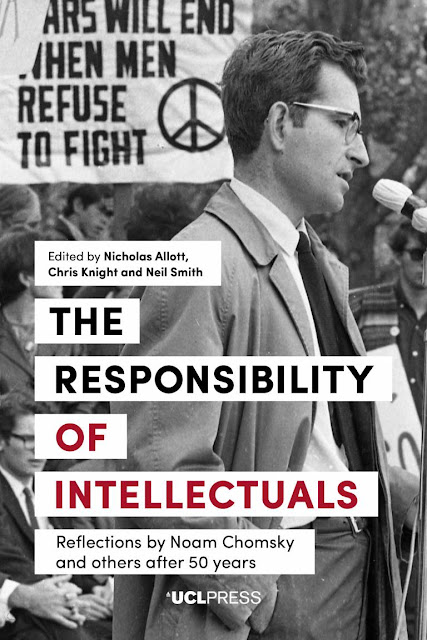
As you may recall, this book by 5 distinguished academics – Greg Philo, Mike Berry, Justin Schlosberg, Antony Lerman and David Miller – was due to have its book launch in Brighton on September 23rd during the Labour Party conference.
However a barrage of abuse from the Zionists and the normal accusations of ‘anti-Semitism’, ‘baiting the Jewish community’ (trans. disagreeing with Zionists) led Waterstones to cancel the book launch at the last minute. Their Head Office took the decision to overrule the local store. The pretext was a lack of professional organisation. James Daunt, their CEO, who I spoke to during this affair, insisted that this was the only reason but it was so obviously not true that he has subsequently admitted that the cancellation was a mistake. Waterstone’s have promised to reschedule the book launch which we await with baited breath.
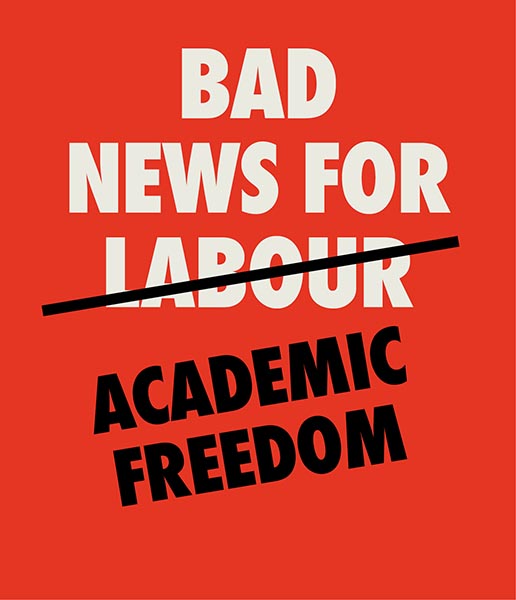
What this demonstrates, along with the attempt by University College London to impose restrictions on the October 29thbook launch for The Responsibility of Intellectuals – Reflections by Noam Chomsky and other intellectuals is that freedom of speech is under attack by the Zionist lobby and its neo-liberal friends in this country.
Professor Chris Knight, one of the authors, wrote to me two weeks before to say that the 5 restrictions below were being placed on the launch by UCL authorities. I responded by saying that they must refuse to comply. If necessary the book launch must take place on the steps of UCL. The McCarthyites must be forced to back down.
I’m pleased to say that Chris and others took my advice and faced with the ensuing embarrassment the university authorities backed down. You only have to look at the five restrictions to see how unacceptable they are. Once again we see how the Labour Party ‘anti-Semitism’ smear campaign has spread outwards. Here are the 5 restrictions that UCL were forced to abandon:
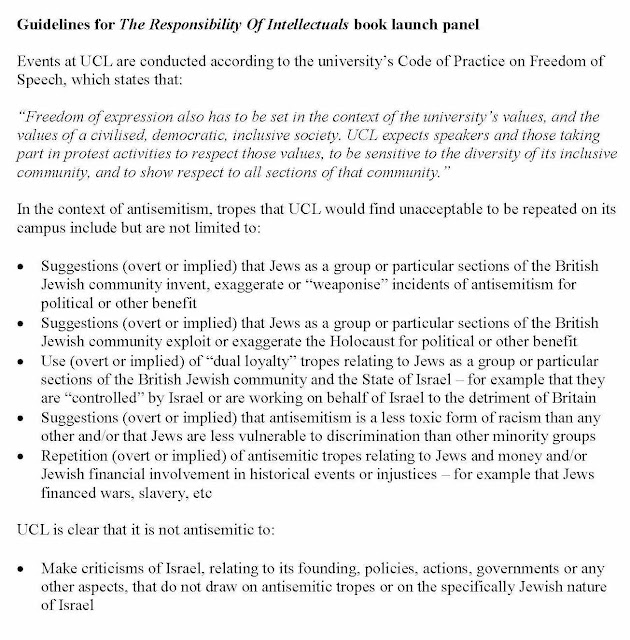
1. Suggestions (overt or implied) that Jews as a group or particular sections of the British Jewish community invent, exaggerate or “weaponise” incidents of antisemitism for political or other benefit
2. Suggestions (overt or implied) that Jews as a group or particular sections of the British Jewish community exploit or exaggerate the Holocaust for political or other benefit
3. Use (overt or implied) of “dual loyalty” tropes relating to Jews as a group or particular sections of the British Jewish community and the State of Israel – for example that they are “controlled” by Israel or are working on behalf of Israel to the detriment of Britain
4. Suggestions (overt or implied) that antisemitism is a less toxic form of racism than any other and/or that Jews are less vulnerable to discrimination than other minority groups
5. Repetition (overt or implied) of antisemitic tropes relating to Jews and money and/or Jewish financial involvement in historical events or injustices – for example that Jews financed wars, slavery, etc
All 5 are contentious:
1. The idea that Jews (they mean Zionists) don’t weaponise anti-Semitism is laughable. That is all the Board of Deputies and groups like the Campaign Against Anti-Semitism do! If you want proof you only need look as far as the front page story in the Jewish Chronicle this week which states that:
“The vast majority of British Jews consider Jeremy Corbyn to be an antisemite. In the most recent poll, last month, the figure was 87 per cent.”
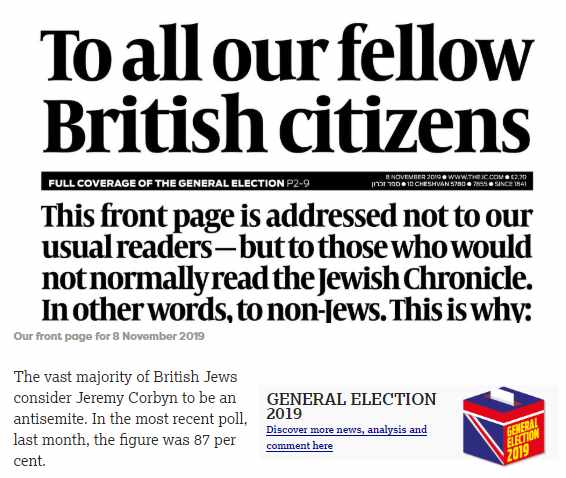
The Jewish Chronicle’s hysterical and desperate headline
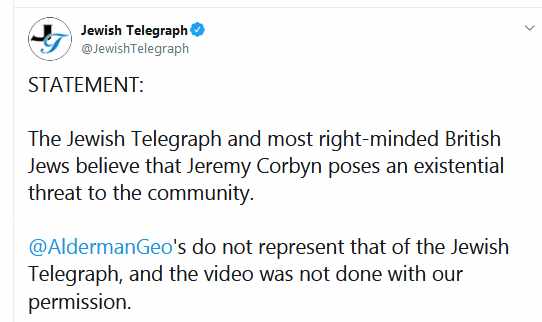
The Jewish Telegraph even took to Twitter to disown their own columnist – Professor Geoffrey Alderman – who has written several books on the Jewish community in Britain
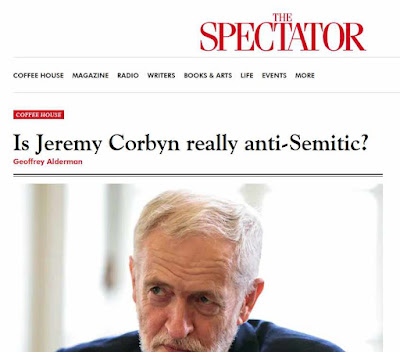
As the respected Jewish (& Zionist) academic Professor Geoffrey Alderman wrote in the Spectator last May, Corbyn had successfully campaigned against the destruction of a Jewish cemetery in his constituency that his tormentor, the foul-mouthed Margaret Hodge had tried to destroy when Leader of the Council.
‘If as the Jewish Chronicle claims 87% of British Jews consider Jeremy Corbyn an anti-Semite then British Jews are amongst the most stupid people on this planet.’
Corbyn has never said anything even remotely anti-Semitic. If indeed 87% of British Jews consider Jeremy Corbyn an anti-Semite and 47% will consider emigrating if he is elected as Prime Minister as the Jewish Chronicle is alleging this week then British Jews are amongst the most stupid (and reactionary) people on this planet. However I prefer to believe that there are lies, damned lies and Jewish Chronicle surveys!
What is true is that if you repeatedly tell people that the Earth is flat long enough some will actually believe it. If British Jews do believe this nonsense then that is a tribute to the effectiveness of the British media or the gullibility of the average British Jew.
ii. The suggestion that Jews (they mean Zionists) don’t exploit the Holocaust for political benefit is one of life’s absurdities. As Edith Zertal, a distinguished Israeli Professor of History wrote in ‘Israel’s Holocaust and the Politics of Nationhood’, there hasn’t been a war involving Israel ‘that has not been perceived, defined, and conceptualized in terms of the Holocaust.’ Israel has mobilised the Holocaust ‘in the service of Israeli politics.’ The Holocaust is used continuously to paint Arabs as the ‘new Nazis’.
iii. Dual loyalty lies at the heart of Zionism. Zionism is founded on the belief that Jews owe their first loyalty, not to the countries they live in, but to Israel. Yes this is anti-Semitic but that’s because Zionism is a form of Jewish anti-Semitism.Zionism argues that Jews are not members of the host nations they live amongst but a separate Jewish nation. That is why the Israeli American Council, in collaboration with the Israeli Embassy, commissioned a poll which asked which country American Jews would side with in case of a serious confrontation between Israel and the United States. In the ensuing uproar the Israeli government withdrew it but it’s clearly a live issue. See Pro-Israel organization sought to survey US Jews on dual loyalty, “Dual Loyalty” Now Embraced, as Israel Interferes in Internal American Politics and In Praise Of Dual Loyalty
iv. Clearly anti-Semitism in Britain today is far less ‘toxic’ than other forms of racism. That is why ‘anti-Semitism’ is the only form of racism that the establishment is concerned with. Why? Because anti-Semitism is not a form of state racism whereas anti-Muslim/Black racism is. The State and its academic mouthpieces like UCL Administration don’t campaign against themselves hence their concern with ‘anti-Semitism’. Jews don’t get stopped and searched, deported ala Windrush, economically discriminated against, beaten up and murdered by the Police or Prison authorities. Obvious anti-Semitism today is less toxic than other forms of racism.
v. Clearly there was Jewish financial involvement in historical events and injustices. Why pretend there wasn’t? Why is it a subject that can’t be discussed? Of course if someone was to suggest that the ‘Jews’ financed the Russian Revolution, the Slave Trade, the Inquisition etc. then that is a different matter but clearly Jews played a part, sometimes a significant part in funding for example the slave trade.
What is staggering is that a university, of all places, should seek to clamp down on discussion and debate on these issues. This is how far the McCarthyist attack on freedom of speech has gone.
Of course when people deny the Holocaust then that isn’t a subject that should be debated anymore than someone denying that the slave trade occurred. That the Holocaust happened is self-evident. None of the leading Nazis involved denied it. Indeed Eichmann boasted of his role. Clearly those who seek to deny the Holocaust want to repeat it. In other words they are not interested in free speech but in inciting racism

But to pretend that the Holocaust is not exploited by the Zionist movement when they have set up a Holocaust Education Trust in Britain which promotes Labour’s fake anti-Semitism smear campaign is absurd. Yad Vashem, Israel’s Holocaust Propaganda Museum even entertains people who are Hitler worshippers such as Duterte of the Philippines [see Philippine Leader Duterte, Who Compared Himself to Hitler, Visits Yad Vashem or just plain vanilla anti-Semites such as Viktor Orban.

Daniel Blatman, a Holocaust researcher at the Hebrew University, Jerusalem and the Chief Historian at the new Jewish Museum in Poland described Yad Vashem as
‘a hard-working laundromat, striving to bleach out the sins of every anti-Semitic, fascist, racist or simply murderously thuggish leader or politician like Hungary’s Viktor Orban, the Philippines’ Rodrigo Duterte and Italy’s Matteo Salvini.’
Below I critically review the book Bad News for Labour which deals with the fake anti-Semitism campaign that the Zionists now wish to immunise against all criticism or analysis.
Tony Greenstein
Bad News for Labour – A Review
Pluto Press, 2019, pp. 288 £14.99
This Review has been printed in substantially the same form by the Weekly Worker as Book they want to ban.
It says all you need to know about the Zionist lobby’s hatred for free speech, that the book launch for Bad News for Labour, about the McCarthyist attack on freedom of speech in the Labour Party, was itself subject to such a torrent of Zionist abuse that Waterstones’ cancelled it, although CEO James Daunt later admitted that this was a ‘mistake’.
So afraid are the Zionists of their scurrilous campaign of defamation being exposed to the light, that a book by 5 distinguished academics, which looks at the evidence for their allegations of ‘anti-Semitism’, was itself portrayed as ‘Jew-baiting’ ‘offensive to the Jewish Community’ and ‘anti-Semitic’.
Presumably British Jews are such delicate flowers that statistical evidence in a dry academic book will cause them to relive the Holocaust!
Instead of standing up for the basic right of freedom of speech on Palestine, Israel and Zionism, Jeremy Corbyn and Jennie Formby have succumbed to their opponents vitriol. Today in the Labour Party anyone who doubts the veracity of the ‘anti-Semitism’ moral panic is now accused of ‘anti-Semitism’. As was the case at Salem, denial of being witch constitutes irreversible proof of being one.
This book should be read in conjunction with The Anti-Semitism Wars (Spokesman Books, 2018) and my chapter ‘The Story so far…’. It is a book in 6 parts, however the book as a whole is less than the sum of its parts. The book suffers from being a dry academic tome rather than treating the evidence it reveals in the context of the politics of Labour and Corbynism.
The book’s major failing is that it fails to locate the source of the anti-Semitism smear campaign. Greg Philo and Mike Berry in ‘What Could Have Been Done and Why It Wasn’t and Will It End’ observe that ‘the claims about anti-Semitism had begun after the election of Corbyn in September 2015.’ (p.45) This is incorrect. The claims began as soon as the media realised that Corbyn was going to win Labour leadership campaign.
People may recall the panic that sent in. MPs like John Mann and Barry Shearman urged Harriet Harman, the interim leader, to call off the leadership election altogether. General Secretary Iain McNicol was meanwhile purging the £3 registered voters, including myself, of anyone that appeared to be a Corbyn supporter.
On August 7th, a month before the result was declared, the Daily Mail ran an ‘exclusive’ Jeremy Corbyn’s ‘long-standing links’ with notorious Holocaust denier and his ‘anti-Semitic’ organisation revealed[1] a completely bogus story alleging that Corbyn had close links with a Holocaust denier, Paul Eisen. This was followed up 5 days later by the Jewish Chronicle’s The key questions Jeremy Corbyn must answer.[2] By the time Corbyn had been elected, on September 5th 2015 the ‘anti-Semitism’ campaign was well underway.
It is fine to suggest, in hindsight, possible strategies to combat Corbyn’s disastrous handling of the anti-Semitism claims, but first it is necessary to actually diagnose where they originated. Never, not once do any of the authors ask the following questions:
i. Is it credible that anti-Semitism spontaneously arose in the Labour Party when Corbyn was elected leader?
ii. How did the allegations of anti-Semitism link in with the allegations that Corbyn was a ‘terrorist’ supporter?
iii. Is it true, as Jonathan Arkush and others allege that socialists, anti-imperialists and anti-Zionists see Jews as inherently rich, powerful and conspiratorial?
During the leadership contest Corbyn had been interviewed by Krishna Guru Murphy on Channel 4 as to why he described Hamas and Hezbollah as his ‘friends’. Corbyn handled it disastrously. His only explanation was that he was simply being polite. Ten years ago however he said that to label either organisation as terrorist ‘is really a big, big historical mistake.’ [Guardian 2.6.17] (p. 59) Corbyn now admits that he made a mistake.
However there was another way he could have handled it. Corbyn could have challenged the ‘terrorist’ term. He could have asked him why Hamas and Hezbollah were terrorists and why a suicide bomb was worse than dropping a massive bomb on a house killing 20 civilians in order to assassinate a Hamas operative? He could have explained that before the Israeli invasion of Lebanon in 1982, when over 20,000 people were killed, there had been no Hezbollah. Hezbollah was a creature of Israel. Hamas was likewise an Israeli creation. Israel’s Shin Bet sponsored it as a bulwark against secular Palestinian nationalism.
Corbyn could have compared Hamas and Hezbollah to the French resistance and asked why one was a terrorist and the other a freedom fighter. He could have pointed to US support for the Contras and other terrorist groups such as the Central American death squads It was Corbyn’s political weakness that prevented him asking these questions because Corbyn too operates within the ambit of western imperialist assumptions.
The authors didn’t even mention this accusation, which is repeatedly usesd against Corbyn. It more than anything has undermined him with the electorate (far more so than ‘anti-Semitism’). On Ireland he could have explained his support for Sinn Fein and pointed to a war against the 40% of the north of Ireland that never accepted Partition. Instead McDonnell apologised profusely for ever having described the IRA as brave!
It is little wonder therefore that Philo and Berry resort to superficial remedies such as ‘a coherent public relations strategy’ or ‘self study and group discussion training’ (pp. 46-47). Yhey suggest the leadership didn’t have a ‘strong public relations infrastructure.’ (p. 60)
Elsewhere they advocate that the Labour Party must ‘acknowledge what has happened is wrong and completely unacceptable for your organisation.’ But this is precisely what has happened. Corbyn has repeatedly apologised and far from helping matters it has been used as ‘proof’ of Labour’s anti-Semitism and Corbyn’s responsibility for it. The authors’ remedy is worse than the cure.
This also assumes that the allegations of anti-Semitism were made in good faith. That Tom Watson, Luciana Berger and John Mann seriously believed that the Labour Party had been overrun by anti-Jewish racism.
This displays incredible naiveté on the part of Philo and Berry. It suggests a political innocence in a debate where guilt must be assumed. It also demonstrates the pitfalls of a purely academic approach to what is a political problem. Statistics alone will not prove that the anti-Semitism ‘crisis’ is less serious than it is made out to be.
The authors commissioned an opinion poll which showed that people believed that ‘anti-Semitism’ had affected 34% of all Labour Party members. However it is easy to demonstrate that the ‘anti-Semitism crisis’ was overblown, disproportionate etc. whilst still accepting that there was a problem. Maybe it is not 34% but there still can be a problem.
This is a fundamentally mistaken approach to take. I would argue that there is no evidence of Labour anti-Semitism nor has there ever been. If we want to talk about racism, then what we need to do is talk about actions not thought, deeds not prejudice.
Tom Watson has said that he won’t rest easy until every last anti-Semite is kicked out of the party. Leave aside the problem of how you define an anti-Semite what we should do is ask what are Watson’s bona fides. Is he being genuine and sincere. Is it the case that Tom Watson really does not sleep well thinking about the plight of Jews in the Labour Party?
In 2010 Labour MP Phil Woolas was removed by the High Court from his position as MP for Oldham and Saddleworth. He had run a campaign of lies against his Lib Dem opponent in the election alleging he supported violent jihadists. During the course of the proceedings an email from Woolas’s election agent surfaced which stated that the campaign strategy must be to ‘make the white folk angry.’ What was Watson’s reaction?
He wrote an article in which he confessed that ‘I’ve lost sleep thinking about poor old Phil Woolas and his leaflets.’ [3] What was the reaction of John Mann and other New Labour MPs? When the High Court removed Woolas Harriet Harman immediately suspended him and removed the whip.
John Pienaar revealed that
‘a mutiny took place during last night’s weekly meeting of the PLP:… The decision to suspend and disown expelled MP Phil Woolas, found guilty of lying by a special election court, has provoked what Labour MPs and former ministers are describing as a “mutiny” against the Labour leadership at Westminster.’
Jim Pickard reported that: [4]
‘there was “real anger” at the event, with a lot of “shouting” from enraged MPs. According to PoliticsHome nine members spoke out. … They included George Howarth, Steve McCabe and Dave Watts, I’m told) Among those to have spoken out in support of Woolas was John Mann, a close friend of his.’
At the Hodge Hill byelection, in Birmingham Tom Watson was Labour’s campaign organiser and issued a leaflet with the slogan: “Labour is on your side, the Lib Dems are on the side of failed asylum seekers.” [5]
John Mann was the publisher of the Bassetlaw anti-social behaviour handbook. which listed amongst it examples the presence of Travellers. In the section on Travellers Mann states: [6]
The police have powers to remove any gypsies or travellers, and have powers to direct people to leave the land and remove any vehicles or property they have with them
Mann was interviewed under caution by the Nottingham Police after Ben Bennett, a 13 year old traveller had complained, first to Jeremy Corbyn who referred the matter to the Chief Whip. As Skwawkbox noted ‘the Whip, surprisingly, decided no action was appropriate and told the family to refer the matter to the police.’ [7]
If someone had called the Jewish community an example of anti-social behaviour does anyone believe that the complainant would have been told to refer the matter to the Police? Margaret Hodge, Watson and Mann would have been jumping up and down. The problem with this book is that no attempt is made at comparative analysis of how Labour deals with other forms of racism. Without such a comparison we cannot see whether or not anti-Semitism is being exceptionalised and if so why.
What we can see is that when it comes to most forms of racism Tom Watson and John Mann have no hesitation in joining in with the racists.
Philo and Berry mention the case of a Welsh councillor who said that Hitler had the right idea when it came to Travellers and asked if ‘anyone got any gas canisters.’ (p. 69) I’m not aware that this individual has been expelled yet the authors do not ask why.
Given that the Gypsies were exterminated in the Holocaust in the same proportions as Jews, what is it about Jews, who are mainly White and privileged, that doesn’t apply to Gypsies? Could it be Israel?
What was needed was not PR strategies, educational counter-offensives or other technocratic solutions but a political counter offensive. But in order to mount a political counter-attack one needs to understand where the ‘anti-Semitism’ offensive was coming from in the first place and that is the primary failing of this book.
When I was suspended from the Labour Party in 2016 subsequent to the false allegations circling around Oxford University Labour Club, it was clear to me that the ‘anti-Semitism’ campaign was not spontaneous but organised by state actors. As Asa Winstanley revealed, the key actor in the Oxford allegations had been an intern for BICOM.
The Lobby by Al-Jazeera confirmed the involvement of the Israeli Embassy but I had no doubt that US and British Intelligence were up to their ears in what was happening, This has subsequently been confirmed by the remarks of Mike Pompeigh and the revelations about the Integrity Initiative. See also Asa Winstanley’s article for Electronic Intifada about how the Jewish Labour Movement was refounded in 2015 for the purpose of taking out Corbyn.
When I spoke in June 2016 in Liverpool, Manchester and Leeds, I explained this succinctly. If I was the CIA Director, the idea that an opponent of NATO and the United States’s wars in the Middle East and a supporter of the Palestinians should be leader of the second major party in Britain, the US’s closes ally in Europe, would have caused nightmares. US Intelligence agencies have spent hundreds of millions of dollars destabilising regimes they don’t like in Latin America and Asia. They have helped fund and support anti-communist groups in Europe when the Communists seemed influential (Italy). On what basis would the USA adopt a ‘hands off’ policy towards Britain?
Would those who brought Pinochet and the Argentinian generals to power, who helped Suharto murder 1 million Indonesians have qualms of conscience about interfering in Britain? None of the authors even raise this question and that is a fatal weakness of this book. Only once do Berry/Philo suggest that ‘it is not therefore illegitimate to ask if Israel or its agencies might be involved in the anti-Semitism issue in Labour. Such a question is not in itself anti-Semitic.’ (p. 75) and there they leave the matter.
The question running through this book is ‘what is anti-Semitism’. For Jonathan Arkush of the Board of Deputies the answer is clear – ‘delegitimising Israel’. (p. 32). Because Israel is a ‘Jewish’ state any attempt to deny the right of Israel to exist is automatically anti-Semitic because it denies Jewish people’s right to self-determination. (pp.40-43). The problem which Philo and Berry don’t mention is that Jews are not a nation. They are members of every nation. It is the anti-Semites who assert that Jews form a separate nation. And even if they were a nation the authors don’t question why opposition to self-determination is racist. Most nations e.g. the Kurds and Catalans not do not have the right of self-determination.
Berry and Philo cite the reaction of Alan Johnson, editor of Fathom, journal of the Israel PR group BICOM to the fact that 77% of Labour members believe the figures of anti-Semitism to have been exaggerated.[8] The authors agree that to deny the existence of cases of anti-Semitism would be wrong. But would it?
It appears that the first example of a genuine Holocaust denier, Chris Crookes, has been found in the International Section of the Labour Party after 4 years.[9] If so he should be expelled but did it take 4 years of ‘anti-Semitism’ allegations to find one example?
Philo and Berry alight on the destructive and nefarious role played by Jon Lansman. Why he decided to act as an outrider for the JLM, confirming at every turn their venomous and destructive allegations will best be left to others. However I have no doubt that Lansman was aware from the very start that the real goal of the JLM was the removal of Corbyn and that it was with this in mind that he said that anti-Semitism was ‘more widespread’ than originally thought. (p. 61) The following year Lansman was again quoted as saying that ‘we have a much larger number of people with hardcore anti-Semitic opinions…’ Again no evidence but as Philo/Berry conclude ‘because it is from such an unexpected source, it carries greater legitimacy.’ (p.62) However I would question how unexpected the source was. He seems to have behaved pretty consistently, as with Jackie Walker’s removal as Momentum Vice Chair!
When Margaret Hodge called Jeremy Corbyn ‘a fucking anti-Semite’ no disciplinary action was taken. Why? Because ‘the leadership had decided to avoid a split in the Party at virtually any cost.’ The problem was that ‘it became impossible to have a coherent or united message.’ This points to the key weakness of Corbyn’s strategy. Appeasing the Right at any price rendered you incoherent and inarticulate, forever fire fighting.
Philo/Berry focus on the fact that Jennie Formby admitted that just 12 people have been expelled for anti-Semitism. They assume that even these 12 were guilty of anti-Semitism. There is a danger when pointing to the minute fraction of those disciplined in assuming guilt. All the evidence is that those suspended, like Jo Bird, the Jewish councillor in the Wirral, were innocent.
I was suspended as part of the fake anti-Semitism witchhunt. This is what Sam Matthews leaked to the Telegraph and Times. But when it came to the charges, the allegations of ‘anti-Semitism’ had disappeared, apart from the use of the term ‘zio’.
The book shows how it is only racist abuse directed at Jewish Zionist members of parliament, Luciana Berger and Ruth Smeeth, that merits attention in the press whereas Diane Abbot’s experiences of far larger amounts of abuse merits no attention. Likewise the studied bigotry of Tory party members, including the Prime Minister, 43% of whom would prefer that Britain didn’t have a Muslim Prime Minister goes unremarked. (pp. 69-70) What the authors don’t ask is why?
Justin Schlosberg frames the anti-Semitism controversy as a prime example of a ‘disinformation’ campaign, which he defines as ‘systematic reporting failures that privilege a particular ideological or political agenda.’ The media narrative rested on two assumptions: firstly that anti-Semitism under Corbyn had become endemic to the Labour Party and secondly that there was a wholesale failure by the leadership to deal with the problem.
Schlosberg argues that the anti-Semitism controversy ‘by its very nature inhibits the development of a counter-narrative’. Why? Because ‘much of the discursive framing serves to pre-emptively de-legitimise any defensive response as ‘part of the problem’.
This goes to the heart of what has happened. Why has the response been so pathetic and weak? Why has JVL lamentably failed to provide an alternative Jewish voice? In these few sentences Schlosberg puts his finger on the unique and problematic nature of the whole anti-Semitism attack.
The problem lies in the subjective nature of the ‘anti-Semitism’ offensive. When Smeeth complained of 25,000 anti-Semitic tweets (which was a lie) or Berger of a deluge of anti-Semitic hate mail (also highly unlikely) it is difficult to rebut. This can only be done by locating both Jews and anti-Semitism in a wider context of racism and imperialism. In other words you can only meet the subjective with the objective. You cannot simply assert that Smeeth and Berger were lying.
Jews in Britain, as Geoffrey Alderman and William Rubinstein have pointed out [see Let’s be honest about Britain’s obsession with “anti-Semitism”] are not economically discriminated against.[10] Rubinstein wrote that ‘the rise of Western Jewry to unparalleled affluence and high status… has led to the near-disappearance of a Jewish proletariat of any size; indeed, the Jews may become the first ethnic group in history without a working class of any size.’
Jews in Britain are not the victims of state racism. Police and fascist violence, judicial bias, stop and search, deportation etc. do not affect them. Jews are White and privileged. Zionist cliques can define their identity in whatever way they choose, however this does not change reality. The IHRA defines ‘anti-Semitism’ by denying the Palestinian experience of oppression and that is why it is illegitimate. No one has the right to define themselves in such a way as to legitimise the oppression of another group.
Schlosberg mentions Labour’s ‘anti-Semitism guidelines’ which were overturned after a concerted Zionist campaign on 4 September 2018 in favour of the wholesale adoption of the IHRA. He quotes Ivor Caplin, then JLM Chair, as saying that
‘There have been extensive discussions about how we deal with anti-Semitism and get it right… I think we are starting to see the progress that I wanted to see.’
Only the Sun, on 5.7.18. ran a story about how JLM representatives had met with Jennie Formby to discuss this. ‘Remarkably, no other reference to this consultation was found within the sample of coverage analysed.’ (p. 89) Barely a month later Pete Mason, Secretary of the JLM claimed on Sky News that ‘there have been no formal conversations with the Jewish community, there have been no invitations offered.’ (p.91) This was a bare faced lie. What really happened was that there had been a furious reaction within the JLM to Caplin’s comments. Caplin had clearly not understood that it was imperative never to accept any concession that the leadership offered apart from Corbyn’s resignation. That was the goal.
The New Statesman was quite happy to go along with this cover up. From the start it had run with the anti-Semitism smears and on July 5th 2018 it ran a propaganda piece masquerading as an article by Mason and Adam Langleben arguing that the JLM had never accepted Labour’s Anti-Semitism Guidelines and there were no differences within the JLM.[11] Their argument was the non-sequitur that ‘If we had approved them, we would have deserved to resign for betraying our members’
The Guardian demonstrated that when it came to the fake anti-Semitism campaign there wasn’t a piece of paper between it and the Tory tabloids. Critics of Labour’s Anti-Semitism Code were 3 times as likely to be quoted as those supporting it. Even the Sun’s coverage was more balanced (pp. 92-93). Television news programmes were four times as likely to quote those attacking as opposed to those supporting the Code. (p.95)
Schlosberg notes that ‘the degree of consensus surrounding the IHRA definition formed the crux of the controversy and evidence of widespread dissensus was overwhelming.’ Jonathan Freedland, who has singlehandedly been responsible for the Guardian’s poisonous output and its stifling of debate, referred to the ‘near universally accepted’ IHRA (p.101) [12]
In fact there was confusion over whether or not the 31 member countries of the IHRA had adopted the definition. In March 2018 the IHRA published a fact sheet showing that just 8 countries had adopted it and when the BBC published a correction of its misstatements they were tucked away out of sight. Persistent efforts to engage with editorial staff at the Guardian over this‘did not bear fruit’ and ‘a protracted formal complaints process resulted in a blanket dismissal of the research by the Guardian’s ‘Reader’s Editor.’ (p. 106)
The Guardian makes great play of what it calls its ‘internal ombudsman.‘ boasting that ‘the Guardian was the first UK newspaper to adopt a readers’ editor in 1997.’ Clearly when it comes to systemic editorial sponsored bias, their Readers Editor is useless.[13]
The fifth chapter by Antony Lerman is based on 3 articles written for Open Democracy. Lerman begins with the allegation made against the Labour Party of ‘institutional anti-Semitism’ by the Zionist ‘charity’ the Campaign Against Antisemitism and the JLM. (p.111) This concept arose with the MacPherson Report into the death of Stephen Lawrence and it represented an ‘appropriation’ of the anti-racist struggle in Britain by supporters of Israel. The Zionists hadn’t contributed anything to the Lawrence campaign or indeed any anti-racist campaign but they acted as parasites on the anti-racist struggles of Black people.
Lerman quotes Chuka Ummuna, who in October 2016 told Labour List that
Some have suggested that there is institutional anti-Semitism across the whole of the Labour Party this is not a view I share, not least because I have not seen one incident of anti-Semitism in almost 20 years of activism within my local Labour Party in Lambeth.[14]
Contrast this with what he told Sky News on 24 February 2019:[15] (p. 140)
I’ve been very clear, the Labour Party’s institutionally anti-Semitic and you either put your head in the sand and you ignore it or you actually do something about it.
Chuka displays all the consistency you would expect of someone who described his own constituents as ‘trash’.[16]
So what is this ‘institutional anti-Semitism’? Lerman goes back to the MacPherson Report where the term first originated when describing the Metropolitan Police’s behaviour towards Black people. He isolates three elements. (p. 143)
i. The ‘collective failure of an organisation to provide an appropriate and professional service to people because of their protected characteristics.
ii. The resulting discrimination
iii. The resulting disadvantage which they suffer as a result.
Lerman shows that if anything there is a de facto discrimination in favour of Zionist Jews in the Labour Party. This is because the JLM, an affiliated socialist society, is only open to Zionist Jews. Non-Zionist Jews, the majority in the Labour Party, are ineligible: ‘no other affiliated society makes membership dependent on the individual expressing support for the official, nationalist ideology of another state.’ (p.148) Normally the EHRC would have their work cut out proving Labour is ‘institutionally anti-Semitic’. However given that their CEO Rebecca Hilsenrath has already stated that ‘the Labour Party needs to do more to establish that it is not a racist party’ there can be no such assumptions. Lerman also notes that two years ago the EHRC ‘was subjected to withering criticism for itself targeting disabled and ethnic minority employees and denying them work opportunities in other agencies.’ (p.155)
Lerman examines whether Labour’s Anti-Semitism Code did reject the IHRA, as the Zionists asserted, and he convincingly demonstrates that it didn’t. This proves that JVL was wrong to have embraced the Code. They put their faith in Labour’s bastard child and their disappointment was all the greater when it was still-born. (p.115)
Lerman is correct when he describes the IHRA as constituting 38 words. Something which the IHRA’s permanent office confirmed on 12 September 2017. (p. 129)
“Antisemitism is a certain perception of Jews, which may be expressed as hatred toward Jews. Rhetorical and physical manifestations of antisemitism are directed toward Jewish or non-Jewish individuals and/or their property, toward Jewish community institutions and religious facilities.”
It is followed by 3 introductory paragraphs which provide a context for the 11 examples of ‘anti-Semitism’, 7 of which relate to Israel. They are permissive and conditional. The examples ‘might’ and ‘could include depending on the context’ anti-Semitism. This is clearly not a definition as it is, as Stephen Sedley observed, indefinite.
Lerman slaps down the CST’s[17] Mark Gardener who ‘is simply wrong when he claims that ‘the definition is a single document but Labour treats it as having two parts.’ It has two parts. Period.’ (p.116)
Lerman shows how the Zionist lobby has systematically lied about the MacPherson ‘principle’. Indeed there is no such principle merely a definition of a ‘racist incident’ which is ‘any incident which is perceived to be racist by the victim or any other person.’ However there was nothing in MacPherson Report that suggests moving from a ‘rule about recording the victim’s perception… to a general rule that only the victim can define the racism they experience.’
This dishonest elision was fronted by Britain’s most dishonest journalist, Jonathan Freedland who tweeted (5.7.19.) that ‘Labour’s decision means a break from the MacPherson standard, which held that a minority was best placed to define prejudice against it.’ Since when has ‘defining’ oppression been the sole preserve of a minority? Are all Jews oppressed and of the one mind? Are all minorities oppressed? Billionaires? Capitalists? War mongers?
Identity politics exclude class and race. Jews in Britain are not oppressed and have no right to define the Palestinian experience by telling them that calling Israel racist is anti-Semitic. Under identity politics there is a conflict of rights – the right of the oppressed vs the right of the oppressor. Since identity politics excludes context and power relations it automatically privileges the powerful, which in this case are Zionist Jews.
Even the Zionist CST in their 2009 Anti-Semitic Discourse Report rejected a victim perception in favour of an objective approach. (p.119) David Feldman, of the Pears Institute for the Study of Anti-Semitism noted that if the definition of racism rested on individual or minority perception then
‘we open the way to conceptual and political chaos…. Without an anti-racist principle which can be applied, generally we are left in a chaotic situation in which one subjective point of view faces another.’ (p.120)
Neveh Gordon, a politics professor at Israel’s Ben-Gurion University observed that ‘The Israeli government needs the “new anti-Semitism” to justify its actions and to protect it from international and domestic condemnation.’ (p. 125) Lerman concludes that one of the consequences of this is that if ‘almost everything is anti-Semitic then nothing is. The word is rendered useless.’ or ‘when anti-Semitism is everywhere it is nowhere. And when every anti-Zionist is an anti-Semite, we no longer know how to recognise the real thing – the concept of anti-Semitism loses its significance.’ (Brian Klug, p. 126)
Never can such a poorly worded piece of prose been so closely examined as the IHRA. Anti-Semitism is defined as ‘a certain perception’ which leaves out discrimination and hostility but, as Lerman remarks, we are not told what this ‘certain perception’ is. David Feldman called it ‘bewilderingly imprecise’. I prefer to think of it as deliberately obfuscatory. (p.130)
Kenneth Stern, who drafted it, warned against making the IHRA legally binding. A situation which may be fast approaching. Geoffrey Robertson QC concluded that the IHRA was ‘not fit for purpose … as an adjudicative standard.’ (pp. 132-133)
Rebecca Gould, an academic at Bristol University, was subject to a demand by the Campaign Against Antisemitism that she be sacked for having written an article Beyond Anti-Semitism for Counterpunch in November 2011. The article linked the use of the Holocaust to the deflection of criticism of Palestinian suffering. That was enough for the CAA. Kenneth Stern called this out as ‘chilling and McCarthy-like’ in his testimony to the US Congress.[18] (p. 134)
By making the term ‘anti-Semitism’ meaningless the IHRA actually makes Jews more, not less, vulnerable to anti-Semitism. (p. 136)
Lerman observes that ‘it is a terrible misjudgement when so-called friends of the Jews exceptionaise Jewish suffering today.’ (p. 154) Tony Lerman is a non-Zionist and not, as far as I’m aware a socialist. He finds all this very baffling. What people find hard to accept is that Zionism has never fought anti-Semitism and has never been concerned about anti-Semitism. As the founder of Political Zionism, Theodor Herzl wrote ‘The anti-semites will become our most dependable friends, the anti-semitic countries our allies.’ [19] Zionism begins at the point at which the fight against anti-Semitism ends. Zionism needs anti-Semitism to survive. Therein lies the answer to Lerman’s dilemmas.
Lerman suggests that ‘one of the particularly distinctive features’ of the anti-Semitism attacks is that it is largely out of Labour’s hands to control. I disagree. It could have dealt with it and its right-wing critics very easily early one. When John McDonnell, in an interview with Lerman says that ‘I’d have erred more on the side of being firmer on some cases’ it is proof that McDonnell doesn’t get it even now.
That isn’t to say that some people in the Labour Party don’t have anti-Semitic ideas in their heads or engage in conspiracy theories with Jews at the centre. In a party of 600,000 that is perfectly possible. One may even find 1 or 2 Holocaust deniers among them. Since it is estimated that 5% of people in Britain, some 3 million, deny the Holocaust, this is not surprising.[20] I suspect though that one would find far more Holocaust deniers in the Tory party!
The point though is that racism is not what is in someone’s head but what they do. There is no evidence at all that anti-Semites are actively campaigning or pushing their views inside the Labour Party. At worst a few will resort to social media but not to put too fine a point on it, no one has ever died from a tweet. However the involvement of Labour Party members in racism against Black people and Gypsies is not confined to ideas.
An example is ex-Labour Home Office Minister Tony McNulty who tweeted that Chris Williamson was an anti-Semite. This is the man who took pride in deporting refugees and Black people. A worse case of racist hypocrisy is hard to find.
If Black people only experienced racism via social media they could consider themselves lucky. We have seen hundreds of Black people deported in the Windrush Scandal, left to die alone and penniless. The prisons are stuffed with Black kids. Racism is endemic in the Police. Jews suffer none of this. When the Labour Party concentrates on anti-Semitism and ignores the record of Tom Watson and John Mann we should conclude that yes, it is institutionally racist but it isn’t institutionally anti-Semitic. (pp. 156-157)
One of the results of the false anti-Semitism allegations is that people lose any understanding of what anti-Semitism actually is. In a 2015 survey 45% weren’t confident they could explain what anti-Semitism is and in a poll in March 2019 some 40% of people didn’t know what anti-Semitism is, rising to more than half amongst under-25’s. (pp. 158-159) Yet, as Lerman observes, the UK must be one of the safest places on Earth for Jews to live! (p.160)
Lerman describes what has happened as a ‘moral panic’, which is when ‘a condition, episode, person or group of persons emerges to become defined as a threat to societal values and interests.’ Which sums up what has happened. It is a definition which could have been applied to the Salem witch hunt over 200 years ago!
Where Lerman goes wrong is to suggest that what has happened is a ‘Jew on Jew war’. Behind the JLM stands non-Jews such as Tom Watson and Joan Ryan. Jews have been the alibi, not the . This is a fundamental misreading of the situation. Unfortunately JVL also fell for the idea that simply creating a non-Zionist Jewish group could remedy this. It was never about Jews.
Hence why Lerman states that the ‘intra-Jewish war and the poisonous atmosphere around Israel’ must be brought to an end. ‘It is a festering sore. It’s a boil that needs to be lanced.’ He goes on to recommend a ‘managed but open debate’ on Israel and Palestine minus all discussion of ‘state based paradigms.’ Again this is wrong. This was never primarily about Israel or the Middle East. It was about Corbyn who was seen as the figurehead of anti-imperialism. The archetypal anti-capitalist. The Middle East and Palestine was secondary not primary. (p. 164)
David Miller suggests that there is a difference between ‘a State of Israel’ and ‘the State of Israel’. I disagree. The intention of the IHRA is quite clear. It is simply that it’s wording is deliberately sloppy and inexact as a means of bringing all within its remit. Miller also suggests that since the advent of Jennie Formby there is now an ‘evidenced based approach’ to disciplinary cases. I disagree. Miller himself may have been acquitted but my experience is that the situation today is worse than under Iain McNicol.
In the Conclusion the emphasis is on stamping out all forms of racism, whoever it is against. It makes no distinction between actions and words. Miriam Margolyes commented that anti-Semitism has been weaponised as a means of attacking Corbyn. The CAA responded that ‘accusing Jews of making accusations of anti-Semitism in bad faith… is a well-established anti-Semitic slur.’ One wonders whether CAA’s accusations against other Jews of ‘anti-Semitism’ are also anti-Semitic? If so my libel action is likely to succeed!
Would this be true of any other group, Whites included? Jews are as capable of being Machiavellian as the next group and Zionists almost by definition are dishonest! (p. 176)
The section finishes with a quote[21] from Alexader Gauland, the co-leader of Germany’s Alternative for Germany (AfD) that the Holocaust was ‘a small bird dropping in over 1,000 years of succesful German history.’ A comment which recalls Le Pen’s description[22] of the Holocaust as only a ‘detail’ of French history. In May the German Bundestag voted to condemn BDS as ‘anti-Semitic’ and it was the AfD which wished it to go further and make BDS a criminal offence.[23] It is an irony that is lost on the stupid leadership of the Labour Party and Corbyn above all. Anti-Semites may hate Jews but they love Israel!
Tony Greenstein
[1] https://www.dailymail.co.uk/news/article-3187428/Jeremy-Corbyn-s-links-notorious-Holocaust-denier-revealed.html
[2] https://www.thejc.com/news/uk-news/the-key-questions-jeremy-corbyn-must-answer-1.68097
[3] http://labour-uncut.co.uk/2010/12/08/tory-lies-lib-dem-lies-phil-woolas-and-a-mystical-shaman-of-truth/
[4] https://www.ft.com/content/1a077a64-49c3-32b7-b5b5-98a4ca7421eb
[5] https://www.theguardian.com/politics/2009/jun/02/tom-watson-step-down-controversies
[6] https://d3n8a8pro7vhmx.cloudfront.net/labourclp50/pages/122/attachments/original/1432291825/John_Mann_anti-social_behaviour_handbook.pdf?1432291825
[7] https://skwawkbox.org/2017/08/27/moderate-labour-mp-interviewed-by-police-over-hate-incident-pamphlet/
[8] http://fathomjournal.org/
[9] https://www.jpost.com/Diaspora/Antisemitism/UK-Labour-expels-Holocaust-denier-Chris-Crookes-18-months-into-suspension-598686
[10] https://electronicintifada.net/content/lets-be-honest-about-britains-obsession-anti-semitism/27711
[11] The Jewish Labour Movement did not approve Labour’s anti-Semitism guidelines. Here’s why
[12] Guardian, 27.7.18. Yes Jews are angry’. Freedland has turned the Guardian’s Comment pages from a discursive to a propagandist broadsheet. https://www.theuardian.com/commentisfree/2018/jul/27/jewish-anger-labour-listen-antisemitism-opinion
[13] https://www.theguardian.com/info/2014/sep/12/-sp-how-to-make-a-complaint-about-guardian-or-observer-content
[14][14] https://labourlist.org/2016/10/chuka-umunna-clause-iv-tells-us-to-live-in-solidarity-tolerance-and-respect-but-labour-has-failed-to-deliver/
[15] https://www.theguardian.com/politics/2018/sep/09/chuka-umunna-labour-is-institutionally-racist
[16] https://www.telegraph.co.uk/news/politics/labour/9973697/Labours-Chuka-Umunna-under-fire-for-labelling-people-trash-on-elite-social-network.html
[17] https://cst.org.uk/
[18] https://docs.house.gov/meetings/JU/JU00/20171107/106610/HHRG-115-JU00-Wstate-SternK-20171107.pdf
[19] https://www.marxists.org/history/etol/document/mideast/greenstein/zionism1.htm#n25
[20] https://www.theguardian.com/world/2019/jan/27/one-in-20-britons-does-not-believe-holocaust-happened
[21][21] https://www.cbsnews.com/news/alexander-gauland-calls-nazi-era-a-speck-of-bird-poop-in-german-history/
[22] https://www.theguardian.com/world/2016/apr/06/jean-marie-le-pen-fined-again-dismissing-holocaust-detail
[23] https://www.theguardian.com/world/2019/may/17/german-parliament-declares-israel-boycott-campaign-antisemitic